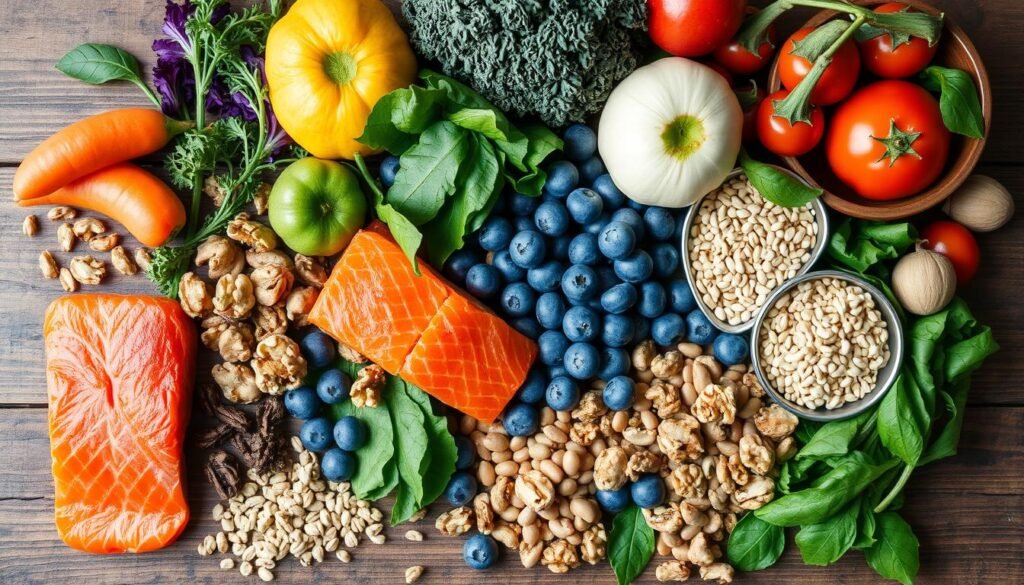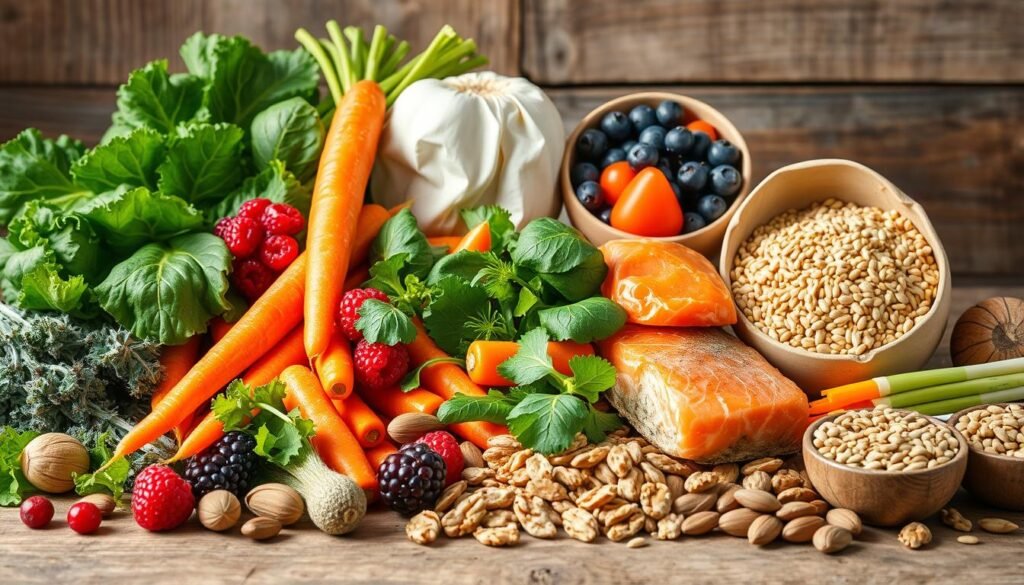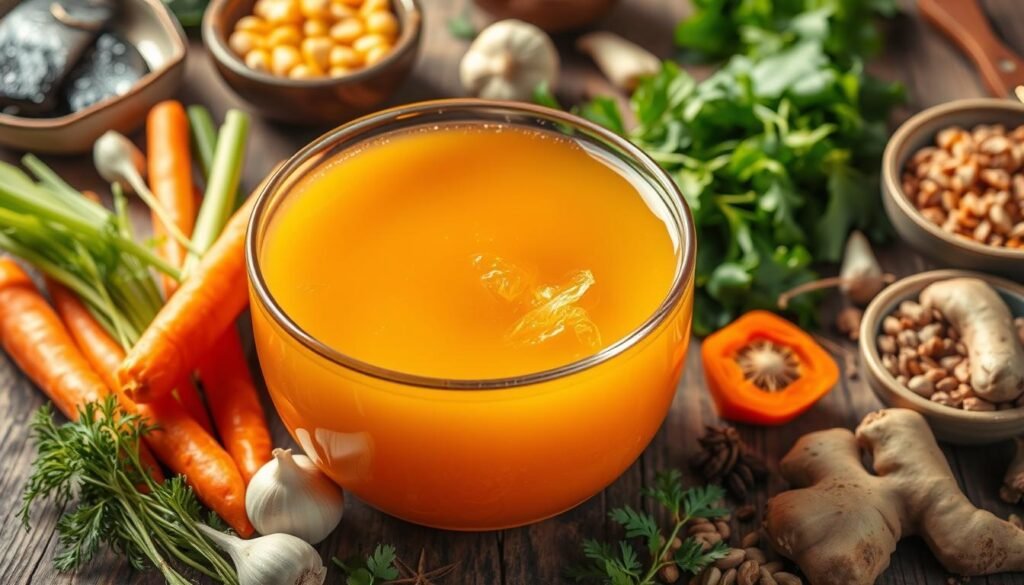Physical Address
304 North Cardinal St.
Dorchester Center, MA 02124
Physical Address
304 North Cardinal St.
Dorchester Center, MA 02124

As we age, our bodies tell stories of our lives. Every step we take leaves a mark. Maybe it was a hike or playing with a puppy that brought you joy. But, sometimes, these moments can be followed by joint pain.
Looking at your diet can help with cartilage regeneration and joint health. Natural remedies and dietary choices can be your allies. They help keep you moving with ease.
Good nutrition is key to feeling your best. It’s not just science; it’s caring for your body. It helps your body heal and stay strong.

Exercise and healthy eating are important at all ages. They help keep your bones and joints healthy. Foods like fatty fish and citrus fruits are full of nutrients that support your body.
To keep your musculoskeletal health in top shape, focus on nutrients that help with cartilage regeneration. Research shows that some foods are key to joint health. This highlights the role of regenerative medicine through what we eat.

Calcium and vitamin D are vital for avoiding osteoporosis. This condition makes bones weak and more likely to break. Eating leafy greens, dairy, and fortified cereals helps meet these needs. Vitamin C is also important for the immune system and making collagen, a key part of joints and cartilage.
To boost musculoskeletal health, add these nutrients to your diet:
Keeping a healthy weight is also key for joint health. Regenerative medicine shows that losing weight reduces pressure on knees and hips. This helps slow cartilage damage, especially as we age.
Eating these essential nutrients supports your joints and overall health. It keeps your body strong against age-related muscle and joint problems. Choose a diet that strengthens your body and keeps your joints healthy, ensuring mobility and freedom from pain for years.
Looking for natural ways to improve joint health? Focus on foods that help reduce joint inflammation and aid in sports injury recovery. The right nutrition is key to keeping joints healthy and functioning well. Let’s explore some foods packed with nutrients good for your joints.
Fish like salmon, mackerel, and sardines are full of omega-3 fatty acids. These fats fight joint inflammation and help prevent bone loss. They’re great for sports injury recovery and managing pain. Adding these fish to your diet can boost your joint health.

Eating these fish is an easy way to get their benefits. For more tips on improving joint health, check out resources on yoga stretches for hip pain relief and diet changes.
Sweet potatoes are tasty and full of magnesium and potassium. These minerals are crucial for bone health by keeping acid levels balanced. This helps keep calcium in bones, supporting strong joints.
Leafy greens like kale, broccoli, and spinach are rich in calcium and vitamin K. These nutrients boost bone mineral density. Eating these greens regularly strengthens bones and supports cartilage and bone structure.
Good nutrition plays a big role in managing joint inflammation and recovering from sports injuries. Try these natural solutions and see how they can improve your joint health and overall well-being.
In your journey to better joint health, knowing about lean protein and amino acids is key. These nutrients help fix bone and muscle, and they’re good for collagen production and cartilage health.
Lean proteins like poultry, tofu, beans, and lentils do more than build muscles. They help your body make collagen, which is vital for strong cartilage. With the right amino acids, your joints can heal better, helping fight diseases like osteoarthritis that affect millions.

Adding amino acids to your diet is more than just supplements. It’s about eating well to support collagen production and tissue health. Here’s how peptides, short chains of amino acids, help:
| Benefit | Description |
|---|---|
| Stimulate Collagen Production | Peptides help collagen grow, which is key for cartilage and joint health. |
| Skin and Tissue Health | More collagen means better skin and faster healing of wounds. |
| Overall Wellness | Peptides also boost metabolism and energy, helping your overall health. |
While these benefits are exciting, always talk to a healthcare provider before changing your diet. Especially for complex issues like joint problems and collagen production. With the right diet, using amino acids and lean protein can greatly help your cartilage and overall health.
Bone broth is back in the spotlight for its healing powers. It’s key for joint health and helping with orthopedic surgery recovery. It’s packed with collagen, minerals, and amino acids. These help improve bone density and support cartilage and joint health.
Collagen is a big part of our bodies, making up about 30 percent of our protein. It’s vital for keeping cartilage strong, which cushions our joints. Drinking bone broth, rich in collagen and gelatin, can help replace what’s lost. This may reduce joint pain and speed up recovery after surgery.
Bone broth is full of minerals like calcium, phosphorus, magnesium, and zinc. These are important for strong bones and joints. They help build bone density and aid in healing and regrowing cartilage and bone.
Adding bone broth to your diet is like using an ancient remedy for joint health. It’s especially good for those recovering from joint injuries or surgery.

| Nutrient | Benefits |
|---|---|
| Collagen and Gelatin | Supports cartilage health, improves skin elasticity, promotes hair and nail growth |
| Amino Acids (Glycine, Proline, Glutamine) | Aid in detoxification, immune support, and digestion enhancement |
| Minerals (Calcium, Phosphorus) | Essential for bone density and structural health |
| Glycosaminoglycans | Key in connective tissue repair and regeneration |
| Glucosamine and Chondroitin | Contribute to joint strength and repair |
Bone broth is more than just food; it’s a natural healing power. Its mix of nutrients supports joint recovery and overall health. It’s a key part of any diet aiming for longevity and vitality. Let’s tap into this ancient wisdom and see the benefits of bone broth for ourselves.
Dairy plays a big role in keeping cartilage healthy. It’s full of calcium, vitamin D, and dairy protein. These nutrients help repair cartilage and support joints. They also help keep bones strong and muscles supported.
Calcium and vitamin D are key for bone health. They also help fix and grow cartilage. Studies show that eating milk can slow down cartilage damage.
So, adding dairy to your diet can help protect your cartilage.
Dairy proteins like whey and casein have all the amino acids needed for fixing tissues and muscles. The tiny particles in milk, called extracellular vesicles, help protect cartilage. They stop harmful enzymes and boost protective factors like TGFβ.
This growth factor is important for cartilage growth and reducing osteoarthritis risk. Eating dairy regularly can help build muscle and keep cartilage healthy.

Milk’s tiny particles also stop the breakdown of important joint parts. They help cells work better, leading to healthier joints. These particles balance bone breakdown and growth, keeping joints and cartilage healthy for a long time.
Adding milk and other dairy to your diet is smart. It’s good for everyone, not just those at risk of osteoarthritis. It helps keep your muscles and bones strong and your cartilage healthy.
Looking to boost your cartilage health? A diet rich in veggies and fruits is key. These foods are full of phytonutrients, antioxidants, and have strong anti-inflammatory effects. They help keep your joints healthy and your cartilage strong.
Adding colorful fruits and veggies to your anti-inflammatory diet helps fight inflammation and oxidative stress. These are big enemies of cartilage health. For example, berries and dark greens are loaded with antioxidants that fight off free radicals.

Research links the Mediterranean diet to lower osteoarthritis rates. This diet focuses on plant-based foods and avoids processed ones. These foods not only reduce inflammation but also help repair and grow cartilage.
Increasing your fruit and veggie intake is good for your health and helps with joint pain. By eating more plant-based meals, you’re investing in your joint health. This improves your quality of life.
Healthy fats play a big role in joint health. They have anti-inflammatory properties. Foods like avocado and olive oil help keep cartilage healthy.
These fats reduce inflammation and make joints move better. Adding them to your diet is key for joint health.
Unsaturated fats in avocado and olive oil are good for joint health. Olive oil has oleocanthal, which fights inflammation like NSAIDs. This can help with joint pain.
Eating these fats can improve your mobility. It also reduces discomfort from joint issues.
These fats also help prevent injuries and support repair. They keep your joints healthy by maintaining a balanced lipid profile.
Nuts and seeds like almonds, walnuts, and flaxseeds are full of essential fatty acids. They have omega-3 fatty acids and antioxidants. These help reduce inflammation and support cartilage repair.
| Fat Source | Fat Type | Key Benefits |
|---|---|---|
| Almonds | Polyunsaturated | Rico en antioxidantes |
| Walnuts | Polyunsaturated | Contains high levels of omega-3 |
| Flaxseeds | Essential Fatty Acids | Promotes cartilage repair and inflammation reduction |
Adding these foods to your diet is good for your joints. It helps prevent and manage joint problems like osteoarthritis. So, make healthy fats a regular part of your meals.
The journey to better joint health is complex. It involves a mix of balanced nutrition and specific nutrients. The Mediterranean diet, with its focus on omega-3s and vitamins, is a good start.
It’s not just about single nutrients. It’s about how they work together in your body. This approach helps repair and maintain cartilage.
Mesenchymal and induced pluripotent stem cells are key in regenerative medicine. They show promise in treating conditions like osteoarthritis. This affects over 27 million Americans.
Therapies like autologous chondrocyte implantation are showing great results. They help improve patient outcomes significantly.
Maintaining joint health is not just about science. It’s also about our daily choices. Being active and eating right are crucial.
These steps help fight degenerative joint diseases. If you’re dealing with joint issues, consider these tips. Talk to healthcare experts for personalized advice.
They can help you create a plan that includes the latest treatments and diet. This will support your joint health.
Foods that help cartilage regeneration include omega-3 rich fish like salmon and mackerel. Bone broth is also good. Leafy greens like kale and spinach are beneficial. Dairy products with calcium and vitamin D are important. Fruits and vegetables rich in antioxidants and vitamin C, like citrus and broccoli, also help.
Key nutrients for cartilage regeneration include calcium, vitamin D, and magnesium. Omega-3 fatty acids, collagen, proteins, and vitamin C are also essential. They work together to keep bones and joints healthy.
Omega-3 fatty acids fight inflammation in joints. They can also help prevent bone loss and fractures. You can find them in certain fish and they’re vital for joint health.
Yes, what you eat can greatly affect sports injury recovery. Eating nutrient-rich foods can reduce inflammation and help repair tissues. This can make recovery faster.
Protein is crucial for repairing bone and muscle tissue. It helps with calcium absorption and supports collagen production. Collagen is key to cartilage health.
Bone broth is good for joints because it’s full of collagen. It also has minerals like calcium and phosphorus. These help strengthen bones and support cartilage.
Calcium and vitamin D together boost bone mass and aid cartilage repair. Calcium strengthens bones, and vitamin D helps the body absorb calcium better.
Yes, plant-based diets can keep joints healthy. They’re full of anti-inflammatory and antioxidant foods. These support cartilage health and reduce inflammation.
Include healthy fats like unsaturated fats in your diet. Find them in avocados, extra-virgin olive oil, nuts, and seeds. These fats are anti-inflammatory and help with healing.
Nuts and seeds help with healing by providing zinc, vitamin E, and fiber. They also have alpha-linolenic acid (ALA), an omega-3 fatty acid. ALA strengthens the immune system and aids in cartilage repair.